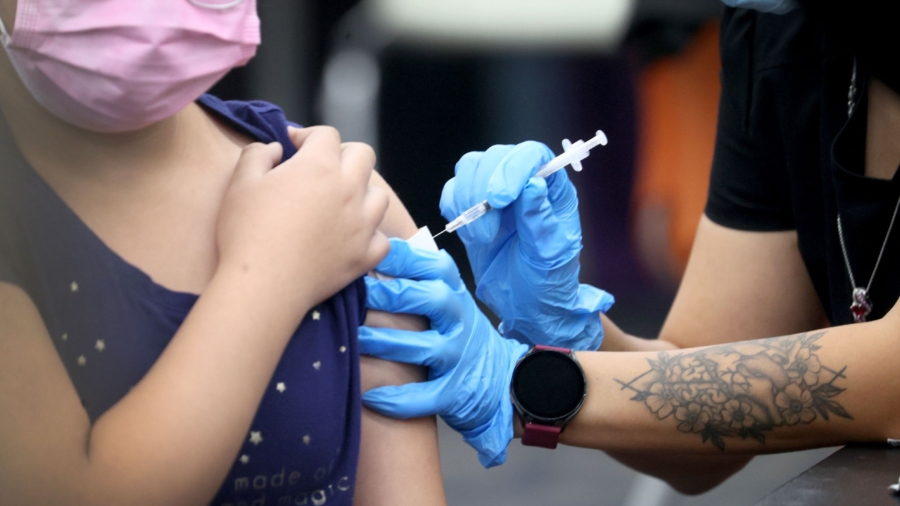A study published in JAMA Network Open on Jan. 3 found that children and adolescents with a history of multisystem inflammatory syndrome (MIS-C), a rare and potentially fatal immune reaction to COVID-19 infection, reported no serious complications after receiving COVID-19 vaccinations.
“We are very reassured by the results,” said Dr. Matthew Elias, an attending cardiologist in the Cardiac Center at Children’s Hospital of Philadelphia (CHOP) and co-author of the study. “This safety data should be comforting to families and healthcare professionals when considering and recommending vaccination.”
CHOP led and the National Institutes of Health (NIH) funded the multicenter, cross-sectional study, which was the largest of its kind to examine COVID-19 vaccination in this group of young people, CHOP reported.
Although the Centers for Disease Control and Prevention (CDC) claims that COVID-19 vaccines are “safe and effective” and prevent severe illness from the virus, little data existed about the safety of vaccination for those with a history of MIS-C. According to the study, some health care professionals and parents were concerned that vaccinating these children might trigger serious adverse reactions or even cause a reoccurrence of the condition.
“Thus, we aimed to describe the adverse reactions following COVID-19 vaccination in this population,” the study said.
Of the 385 patients in the study, all had a prior MIS-C diagnosis and were eligible for COVID-19 vaccination. They were surveyed between Dec. 13, 2021, and Feb. 18, 2022. The study involved 22 medical centers—21 in the United States and one in Canada—that were participating in a National Heart, Lung, and Blood Institute (NHLBI) and NIH-sponsored study, called Long-Term Outcomes After the Multisystem Inflammatory Syndrome in Children (MUSIC).
Vaccine eligibility was defined as aged five years or older and at least 90 days after an MIS-C diagnosis.
Patients who had received a COVID-19 vaccine prior to being diagnosed with MIS-C were excluded from the study’s analysis.
Of the study group, 185 (48.1 percent) received at least one vaccine dose, which the study said was “generally comparable” with the CDC’s national data. The participants’ median age was 12.2 years, and 73.5 percent of them were male.
Of the study participants who received at least one dose of a COVID-19 vaccine, almost all (98.9 percent) were administered the Pfizer BioNTech COVID vaccine.
The study found that the patient-reported adverse reactions to the vaccine were mild with no diagnosis of myocarditis (heart inflammation) or a reoccurrence of MIS-C, and none of the participants required medical testing or hospitalization. The most common side effects were arm soreness, fatigue, and fever, which mirror the CDC’s reported reactions of the general population for the same age group.
The results of the study led to its conclusion: “These findings support the CDC recommendation for COVID-19 vaccination at least 90 days following MIS-C diagnosis, with ongoing surveillance of adverse events,” researchers said.
The CDC, NIH, NHLBI, and Pediatric Heart Network supplied grants for the JAMA study, and at least four of the co-authors disclosed financial ties to pharmaceutical companies, including Pfizer, outside the study.
MIS-C Background
According to the CDC, most children infected with COVID-19 experience mild symptoms or none at all. However, a very small percentage—about one in 3,000 to 4,000 children and teens under the age of 21—go on to develop MIS-C, a poorly understood and rare condition that occurs about two to six weeks after contracting the virus and can lead to organ failure.
The CDC explains that MIS-C is a serious inflammatory condition that affects the heart (myocarditis) and other organ systems, including the lungs, kidneys, skin, eyes, and gastrointestinal tract. On very rare occasions, the syndrome can be deadly, but the CDC claims that most children who are diagnosed with the condition get better with medical treatment.
MIS-C can develop whether or not the child had experienced symptoms of COVID-19, as the virus may have gone undetected.
MIS-C is a new condition that was first reported in April 2020 shortly after COVID-19 became widespread throughout the United States. The CDC began tracking MIS-C cases in May 2020. As of Jan. 3, 2023, 9,333 cases have been reported, and 76 deaths occurred in the 55 U.S. jurisdictions reporting, that is, all 50 U.S. states, New York City, Puerto Rico, Guam, U.S. Virgin Islands, and Washington, D.C.
The CDC acknowledged that the condition is on the decline. Dr. Audrey Dionne, a pediatric cardiologist at Boston Children’s Hospital, assistant professor of pediatrics at Harvard Medical School, and co-author of the JAMA study, attributes its decline to an increased vaccination in the under-21 age group.
“A big part of that decline is that COVID vaccination has been protective against this rare condition in those who have received it,” Dionne told NIH.


